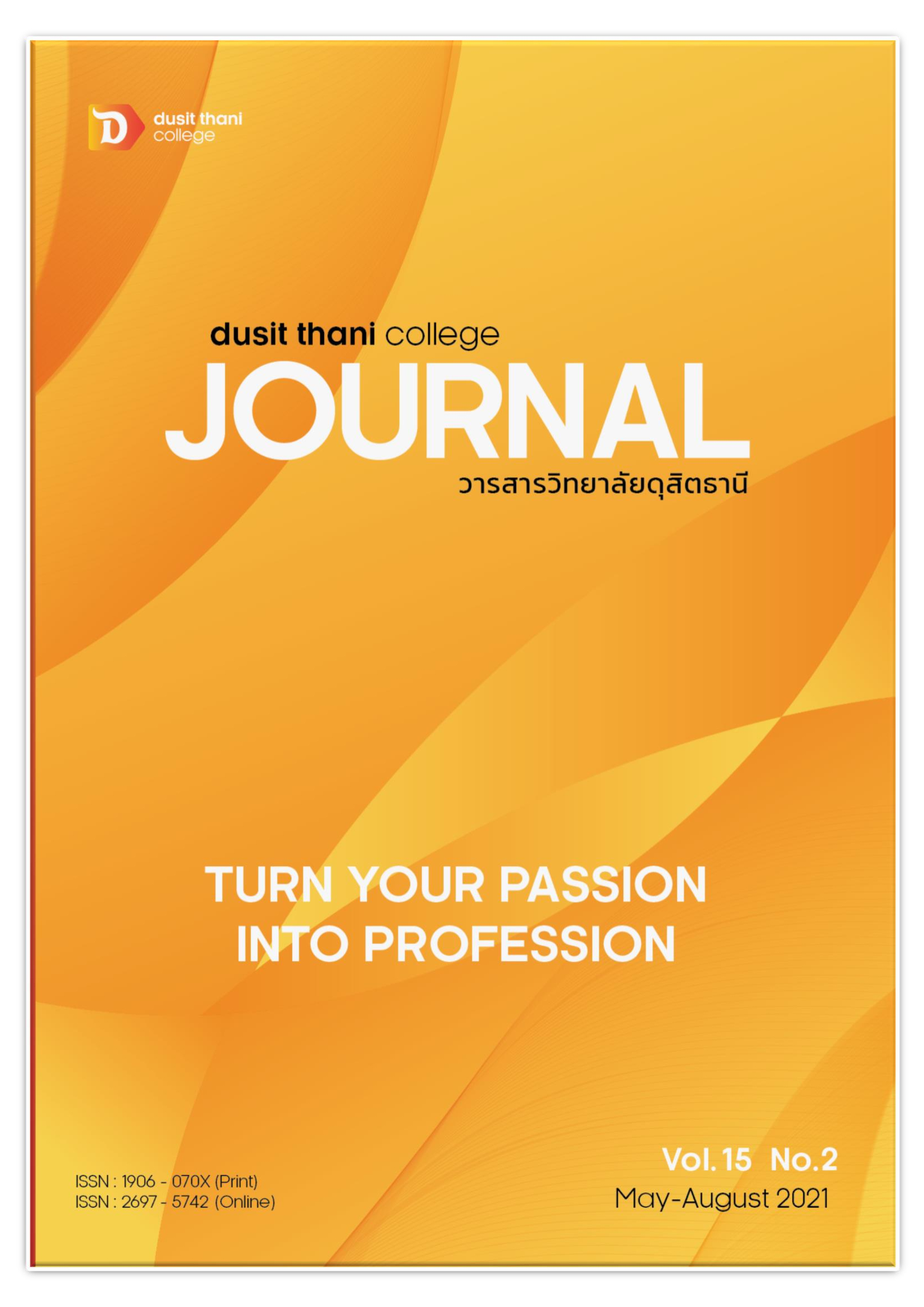ปัจจัยที่มีอิทธิพลต่อความผูกพันต่อองค์กรของบุคลากรกลุ่มเจเนอเรชั่นวาย ในธุรกิจร้านอาหารระดับหรู ในกรุงเทพมหานคร
Main Article Content
บทคัดย่อ
การวิจัยครั้งนี้มีวัตถุประสงค์ (1) เพื่อศึกษานิยามความผูกพันต่อองค์กรของบุคลากรกลุ่มเจเนอเรชั่นวายในธุรกิจร้านอาหารระดับหรูในกรุงเทพมหานคร (2) เพื่อศึกษาปัจจัยที่มีอิทธิพลต่อความผูกพันต่อองค์กรของบุคลากรกลุ่มเจเนอเรชั่นวายในธุรกิจร้านอาหารระดับหรูในกรุงเทพมหานคร การวิจัยนี้เป็นการวิจัยเชิงคุณภาพ โดยเก็บรวบรวมข้อมูลด้วยวิธีการสัมภาษณ์เชิงลึก ผู้ให้ข้อมูลหลักคือ พนักงานระดับปฏิบัติการและหัวหน้างานกลุ่มเจเนอเรชั่นวายที่ปฏิบัติงานในธุรกิจร้านอาหารระดับหรูในกรุงเทพมหานคร ที่เกิดระหว่าง พ.ศ. 2523-2540 และมีอายุงานมากกว่า 1 ปีขึ้นไป จำนวน 12 คน โดยแบ่งเป็นพนักงานระดับปฏิบัติการ 6 คนและหัวหน้างานกลุ่มเจเนอเรชั่นวาย 6 คนจากร้านอาหารจำนวน 6 ร้าน ที่ได้รับการรีวิวว่าเป็น 10 ร้านที่ดีที่สุดในกรุงเทพฯ จาก Wongnai.com ผลการวิจัยพบว่า (1) บุคลากรกลุ่มเจเนอเรชั่นวายในธุรกิจร้านอาหารระดับหรูแบ่งนิยามต่อความผูกพันต่อองค์กรออกเป็น 3 นิยามหลัก ประกอบด้วย 1) ความรู้สึกรักและห่วงใย 2) การอุทิศตนเพื่อองค์กร 3) ความต้องการที่จะดำรงความเป็นสมาชิกภาพขององค์กร (2) ปัจจัยที่มีอิทธิพลต่อความผูกพันต่อองค์กร แบ่งออกเป็น 2 ปัจจัยหลัก ประกอบด้วย 1) ปัจจัยลักษณะองค์กร มีทั้งสิ้น 6 ด้าน ประกอบด้วย ด้านนโยบายของบริษัทและการบริหารงาน ด้านภาวะผู้นำของผู้บังคับบัญชา ด้านความสัมพันธ์กับเพื่อนร่วมงาน ด้านสภาพการทำงาน ด้านการฝึกอบรมและพัฒนาและด้านชื่อเสียงขององค์กร 2) ปัจจัยลักษณะงาน มีทั้งสิ้น 4 ด้าน ประกอบด้วย ด้านความมีอิสระในงาน ด้านความท้าทายของงาน ด้านโอกาสก้าวหน้าในงาน และด้านการมีส่วนร่วมในงาน ผลการวิจัยนี้จะเป็นแนวทางให้ผู้ประกอบการในการกำหนดหรือปรับปรุงปัจจัยที่มีอิทธิผลต่อความผูกพันต่อองค์กรของบุคลากรกลุ่มเจเนอเรชั่นวายในธุรกิจร้านอาหารระดับหรู โดยนำปัจจัยลักษณะองค์กร ด้านการฝึกอบรมและพัฒนาผนวกรวมกับปัจจัยลักษณะงาน ด้านโอกาสก้าวหน้าในงาน นำมาประยุกต์ใช้ในองค์กรเพื่อพัฒนาความรู้ความสามารถให้กับพนักงานในการบริการและวางแผนความก้าวหน้าในอาชีพให้พนักงานเห็นเส้นทางการเติบโต ซึ่งจะทำให้พนักงานเกิดความรักความผูกพันกับองค์กรและธำรงรักษาบุคลากรที่มีคุณภาพให้คงอยู่กับองค์กรได้อีกด้วย นอกจากนี้ผู้ประกอบการยังสามารถนำปัจจัยลักษณะองค์กรด้านความสัมพันธ์กับเพื่อนร่วมงานและสภาพการทำงาน มาวางแผนการจัดสภาพการทำงาน การออกแบบงาน กระบวนการทำงานที่เอื้อต่อการปฏิบัติงานร่วมกัน มีความเป็นทีมงาน ซึ่งเป็นสิ่งที่บุคลากรเจนเนอเรชั่นวายต้องการ
Article Details
นโยบายการพิจารณากลั่นกรองบทความ
- บทความวิจัยและบทความวิชาการทุกเรื่องที่จะได้รับการตีพิมพ์ต้องผ่านการพิจารณากลั่นกรองโดยผู้ทรงคุณวุฒิ (Peer Review) ในสาขาที่เกี่ยวข้อง จำนวน 3 ท่าน/บทความ
- บทความ ข้อความ ภาพประกอบและตารางประกอบที่ลงตีพิมพ์ในวารสารเป็นความคิดเห็นส่วนตัวของผู้เขียน กองบรรณาธิการไม่จำเป็นต้องเห็นด้วยเสมอไป และไม่มีส่วนรับผิดชอบใด ๆ ถือเป็นความรับผิดชอบของผู้เขียนแต่เพียงผู้เดียว
- บทความที่จะได้รับการตีพิมพ์จะต้องไม่เคยตีพิมพ์ เผยแพร่ที่ใดมาก่อน และไม่อยู่ระหว่างการพิจารณาของวารสารฉบับอื่น หากตรวจสอบพบว่ามีการตีพิมพ์ซ้ำซ้อน ถือเป็นความรับผิดชอบของผู้เขียนแต่เพียงผู้เดียว
- บทความใดที่ผู้อ่านเห็นว่าได้มีการลอกเลียนหรือแอบอ้างโดยปราศจากการอ้างอิง หรือทำให้เข้าใจผิดว่าเป็นผลงานของผู้เขียน กรุณาแจ้งให้กองบรรณาธิการวารสารทราบจะเป็นพระคุณยิ่ง
เอกสารอ้างอิง
Bruce Tulgan. (2009). Not everyone gets a tophy-how to manage Generation Y.
Jossey-Bass: USA.
Charlearmkwun Meksuk and Prasopchai Pasunon. (2017). “Quality of Work Life Factors Affecting Organization Commitment of Operational Staffs of Siam Fittings Company Limited.” Journal of Business Review. 9(1), (January - June 2017) : 33-49. (in Thai)
Cherrington, J. D. (1994). Organization behavior the management of individual and organization performance. Massachusetts: Allyn and Bacon.
Department of Business Development. (2019). Restaurant Business. (Online). From https://www.dbd.go.th/download/document_file/Statisic/2562/T26/T26_201902.pdf (in Thai)
Hewitt Associates. (2003). Overview. [Online]. Retrieved: Feb 20. From http://was4.hewitt.com/hewitt/about/overview/index.htm.
International Survey Research. (2004). Emplyee Engagement in Context. [Online].
Retrieved: Jan 20. From http://www.cipd.co.uk/NR/rdonlyres/6D7D52C8-6E51
Kanter, R. M. (1968). Commitment and Social Organization: A study of commitment mechanism in utopian community. American socialogial Review, 37, 499-517
Matinee Sirisarn. (2011). Expectations about Working Together with the New Generation Supervisors. Independent Research for Master of Labor and Welfare Development Program Thammasat University. (in Thai)
Mowday, R. T., Steers, R. M., and Porter, L. W. (1982). Employee organization linkages:
The psychology of commitment, absenteeism, and turnover. New York: Academic.
Porter, L.W., Steers, R.M., Mowday, R.T., and Boulian, P.V. (1974). Organizational commitment, job satisfaction, and turnover among psychiatric technicians. Journal of Applied Psychology, 59, 603-609
Puangpen Churintr. (2009). The Effect of Recognition and Disclosure on Market Value of Equity: The Case of Separate and Consolidated Financial Statements of Listed Firms in the Stock Exchange of Thailand. Dissertation for Doctor of Philosophy Program in Accountancy. Chulalongkorn University. (in Thai)
Saowanee Kaewamanee. (2006). Employee Engagement, Human Management Journal. 27(1): 3.
Siriwan Maansiri. (2015). The Factors Affecting to Organizational Commitment of Personnel Under Chachoengsao Provincial Office of The Non-Formal and Informal Education. Independent research for Master of Education Program. Rajabhat Rajanagarindra University. (in Thai)
Skaorat Intusmith. (2000). Corporate Culture perception Organizational Engagement and Employee Resignation: A Case Study of the Electricity Generating Authority of Thailand. Thesis for Master of Science. Kasetsart University. (in Thai)
Somjid Junphen. (2014). Organizational Commitment of the Officials at the Community Organizations Development Institute (Public Organization). Independent research for Master of Arts Program in Social Development. National Institute of Development Administration. (in Thai)
Steers, R. M. (1977). Antecedents and Outcomes of Organizational Commitment. Administrative Science Quarterly, 22: 46-56.
Wichai Waenphet. (2000). Human relations in industrial administration. Bangkok: Thammkamon.
Wilaiwan Boonwisen. (2013). A Study of Customers Satisfaction Towards Services Marketing Mix of Ryu Shabu Shabu Siam Square. Independent research for Master of business administration program. Sripatum University. (in Thai)


